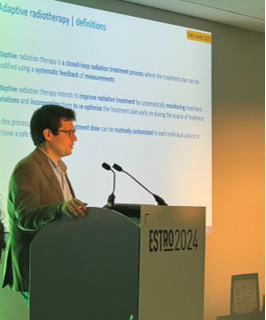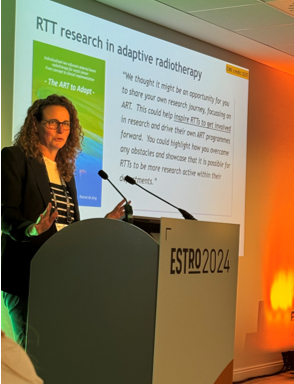Innovations and Insights from the Online Adaptive Radiotherapy Workshop for RTTs 2024
The workshop on the skills that radiation therapists (RTTs) require regarding online adaptive radiotherapy (oART) was held as part of the pre-ESTRO conference workshop series. Leading radiation oncology and medical experts from across Europe shared their insights on the evolving role of RTTs in oART. The workshop, led by Helen McNair (Royal Marsden NHS Foundation Trust, UK) and Elizabeth Forde (Trinity College Dublin, Ireland), provided a comprehensive overview of oART workflows and explored the critical skills that RTTs require to implement these cutting-edge techniques in clinical practice.
Luca Boldrini, a radiation oncologist from Fondazione Policlinico Universitario "A. Gemelli" IRCCS (Italy), presented the important definitions of oART and its clinical indications. He highlighted its growing significance in personalised cancer care and its role in the adaptation of treatment to daily anatomical changes, particularly in sites such as prostate, rectum, cervix and head and neck.
Uulke van der Heide, a medical physicist from the Netherlands Cancer Institute Amsterdam/Leiden University Medical Centre, followed with a discussion on the dosimetric benefits of oART. He emphasised the precision and efficacy of this approach in the improvement of patient outcomes and provided examples of margin reduction strategies and dose-escalation through the use of MRI-guided oART.

Luca Boldrini, Radiation Oncologist Fondazione
Policlinico Universitario, ”A. Gemelli" IRCCS (Italy).
Discussions focused on the implementation of oART. Dirk Verellen introduced the use of failure mode and effects analysis to mitigate potential risks; he highlighted the parallels in aviation and the rise of artificial intelligence in our practice. The RTT presence was strong; Lykke Kildegård Johansen, from Rigshospitalet, Copenhagen (Denmark), and Reijer Rutgers, from the University Medical Centre Utrecht (The Netherlands), further outlined the RTT’s pivotal role in adaptive workflows based on cone beam computed tomography and MRI. This shift places RTTs at the forefront of these technological advancements, including that of functional imaging during oART.
Break-out workshops were facilitated by the workshop’s presenters, including Bethany Williams from the Royal Marsden, UK. They enabled participants to engage directly in discussions of two of the three key oART elements of contouring, dosimetry or patient workflow. They included feedback from pre-workshop case studies and real-world examples to enable participants to grasp, experience and appreciate oART processes.
Elizabeth Joyce, an RTT from the Royal Marsden, UK, emphasised the specific skills and training that RTTs need to ensure successful oART implementation. Beyond radiation oncology, Laura McGregor, a UK consultant in emergency medicine, spoke passionately about decision-making under stress. She provided practical strategies for maintaining clarity and focus in high-pressure environments and spoke about the evolution of rudeness in teams, noting that “civility saves the lives of patients and staff”.
A favourite of mine was the speech by Rianne de Jong, an RTT from Amsterdam University Medical Centre (The Netherlands), who closed the day by presenting ongoing RTT research in adaptive radiotherapy. She highlighted the importance to the patient of continued innovation and impact as key themes in research.

Rianne de Jong, RTT from Amsterdam University
Medical Centre (Netherlands)
This workshop reflected the growing influence of RTTs in oART and underscored their indispensable role in the delivery of adaptive treatments that enhance patient care and outcomes. Many congratulations to Helen, Liz and all the day’s presenters on their high-quality presentations, expert advice and insights into the role of the RTT in oART. The workshop was inspiring and uplifting as it highlighted the potential and likely real-world, not-too-distant future of RTTs across the globe.

Meegan Shepherd
Specialist radiation therapist, Northern Sydney Cancer Centre, Royal North Shore Hospital, St Leonards, NSW, Sydney, Australia
Adjunct lecturer, Monash University, Clayton, Victoria, Australia
meegan.shepherd@health.nsw.gov.au